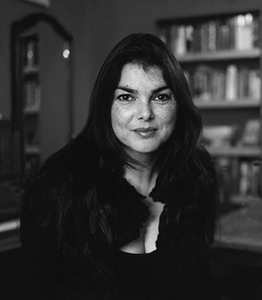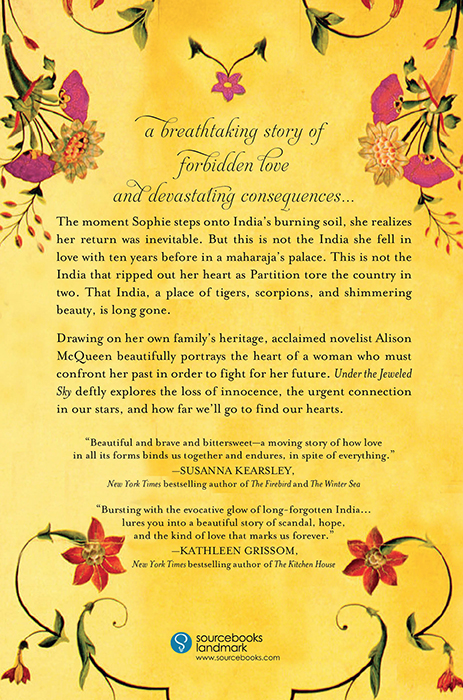Under the Jeweled Sky (39 page)
Read Under the Jeweled Sky Online
Authors: Alison McQueen

Q. Where did you get the idea for
Under the Jeweled Sky
?
A.
Under the Jeweled Sky
was inspired by memories of the women I would eavesdrop on, the hushed voices and grave expressions passed over teacups. My mother and her friends had grown up in the days before such things were openly spoken of. But it was all there: domestic violence, unwanted pregnancies, addiction, ruin, and occasional salvation.
Among the whispers I overheard as a child was the story of the love affair that ended in tragedy and scandal and, separately, the tale of the baby who was birthed in secret and left at an orphanage in Delhi. Adults think that small children are not listening, or that if they are, they are too young to take anything in. But this is not so. I remember everything.
Q. Why did you set the story in the 1940s and 1950s?
A.
Under the Jeweled Sky
unravels the fragile construct of a dysfunctional British family and watches its slow disintegration in the wake of World War II, the subsequent partition of India, and a scandal with terrible consequences. The tangle of politics and diplomacy during both periods seemed like a fitting backdrop to the disordered lives of the characters, with layers of deceit and half-truths and nothing being quite what it seems.
Q. How did you learn about the details of what India was like back then?
A. One strand of the novel is partially set in a maharaja's palace. Although the palace and its location is anonymous and fictional, I did have an inside track into life inside an Indian palace. In her twenties, my mother was hired as the private nurse to the Maharaja of Indore's mother-in-law. She arrived there from Bombay and was shown to her quartersâan enormous suite in a grand building set across the grounds from the main palace. A car was sent for her every morning, but she preferred to walk. So off she would go, strolling through the grounds while the car followed along a few yards behind, driving at a snail's pace in case she should change her mind. Her breakfast would be served to her on a solid silver service, with a footman standing by should she want for anything.
From what she has told me, I am not sure that she handled it particularly well. She said that she didn't want any fuss, which was quite the wrong way to go about things in a palace. There was also an incident when she was caught preparing her own boiled egg, which didn't go down well at all. The cook was quite overcome with grief, and my mother never ventured to lift a finger again. I have to say, I rather like the thought of that.
Q. How did your personal history inform the novel?
A. My mother was born in Assam in 1928. The daughter of an unproclaimed liaison, she came to England thirty years later, never meaning to stay, and met my father. I was born in London in 1964, four years before Enoch Powell's “Rivers of Blood” speech. Mixed marriages were still a rarity then. I knew that I had a grandfather and that he had a farm in Africa, in Southern Rhodesia as it was then known, but I never met him. He existed only as a single photograph in my mother's album. My father was an orphan, dumped on the steps of a Barnardo's Home at the age of five. With so little information about who I was and where my family came from, it's little wonder I became a writer.
Some years on, I pestered my mother about why she had never gone to Africa to visit her father. My mother got very cross and eventually said that for a brown face to turn up on her father's doorstep “just wouldn't do.” Those were her exact words.
It was my father who took me aside one day and whispered that my mother and her sister were born outside of marriage. They were the children of a British tea-planter, born to his Indian concubine, and the shame of it had followed my mother like a shadow her whole life. I have no doubt she thought the world would come tumbling down if anyone found out, for that is what she had been conditioned to believe.
My mother and her sister, aged five and seven, were taken from their mother and sent to a remote convent to be educated before being trained as nurses. My mother was just eleven when she last saw her father. She has no idea what happened to her mother. On the day she left school, she was taken into the mother superior's office and told that the woman she thought to be her aunt, her father's sister, was actually his wife.
As the years wore on, my mother began to talk to me, as though unburdening herself of every memory, good or bad. We pored over maps, trawled through old pictures and keepsakes, and trudged around India. She cried a lot, too, which was hard. Recently, she gave me a box of letters and photographs that I had never seen before. I don't think anyone else had either.
About twenty years ago, when she was in her sixties, my mother disclosed to her sister that she had told her family about their past. Her sister was furious, having kept the secret from her own children. My mother shrugged off her anger and told her we all thought it was marvelous and very romantic. Although it wasn't romantic, of course. It was tragic and heartbreaking and had left two women's lives with a backdrop of unspeakable sorrow.
My mother imparted her stories to me over many, many years. She told me things she had never told anyoneânot just her secrets, but those of her friends, my “aunties.” I came to know things that their own children didn't know, and probably still don't. Nobody talked about these things. They still don't.
I promised my mother I would remember her stories and pass them on to my own children so they might always have a sense of belonging. All my aunties are now dead; my mother is the only survivor. Any sense of shame about the past has long since fallen away. She has learned to be proud of who she is and where she came from, just as we are.

Photo credit: Jayne West
Born to an Indian mother and an English jazz musician father, Alison McQueen grew up in London and worked in advertising for twenty-five years before retiring to write full time. Alison lives in Northamptonshire, England, with her husband and two daughters.

